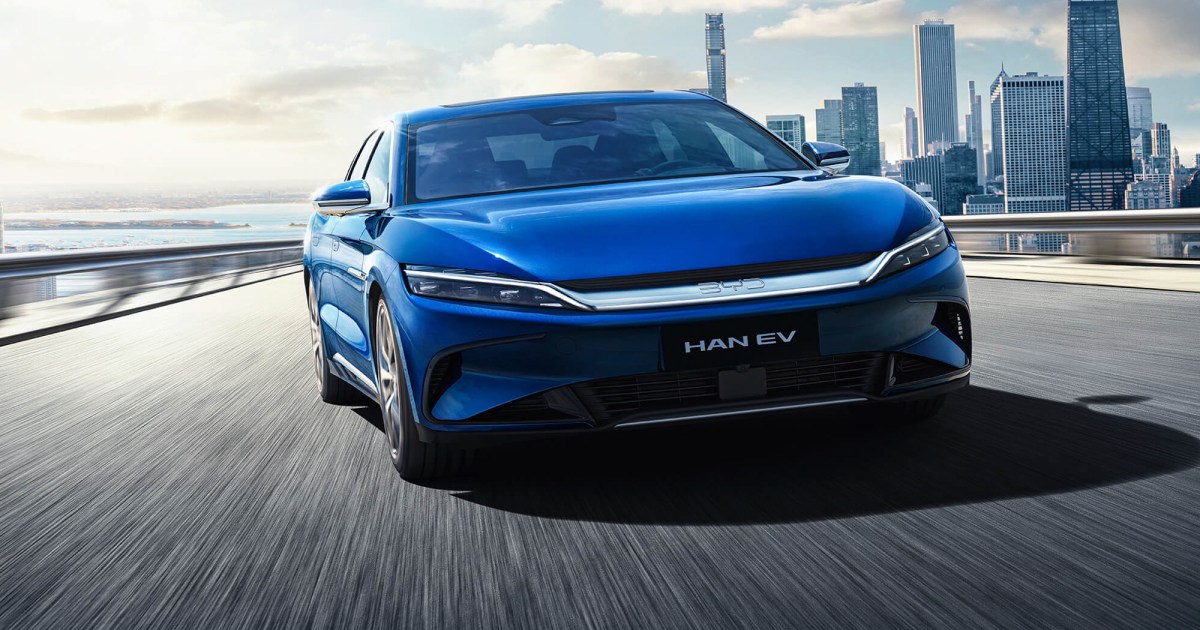The electric vehicle market is seriously heating up, with more great options being released every few months. But while there are more and more excellent electric vehicle options available, it’s still hard to find a great EV that doesn’t cost at least $40,000 or so.
But there could be a solution to that — or at least a way to ease the problem. How? High-quality, low-cost Chinese EVs.
Competition
At face value, the solution to lowering EV prices is simple — and involves a combination of the cost of new tech decreasing over time, while automakers release more and more models, increasing competition and pushing companies to create better-value vehicles.
But while the tech is slowly getting cheaper, EV competition in the U.S. is increasing at a much slower pace than we might have assumed it would a few years ago. Sure, automakers are releasing new models, and the likes of Ford, GM, and others are slowly revamping their lineups to include more electrified options. But there are far more automakers out there than those in the U.S.
Tesla is currently the largest manufacturer of electric vehicles in the world — but did you know that it’s only slightly ahead of another company? That company is called BYD, and it has essentially been blocked from importing vehicles into the U.S. through massive tariffs that specifically target EVs from China. There are other large Chinese EV manufacturers too — including Geely Auto Group, which is larger than BMW and Hyundai.

Cars from these companies are highly affordable, too. The flagship BYD Han comes in at 229,800 yuan, which equates to around $32,208, while the cheaper BYD Dolphin, a competitor to the Chevrolet Bolt, starts at only around $14,000. To be clear, there’s almost no way that these vehicles would actually be sold at these prices in the U.S. — BYD would certainly want to price the vehicles at higher rates given the average cost of EVs in the U.S., not to mention import fees. But BYD could at least undercut much of the current U.S. competition, forcing other automakers to lower their prices.
Of course, even without Chinese EVs, competition will continue to grow in the U.S. — both from legacy automakers, and from new companies like Rivian and Lucid. The question is, will competition grow quickly enough?
What are the fears?
To be clear, Chinese EVs aren’t banned in the U.S. for no reason.
For starters, there are economic reasons. Automotive manufacturing is a massive sector in the U.S. economy, and having access to Chinese EVs could radically change that. If Chinese EVs were available in the U.S., plenty of U.S. automakers would struggle to keep up with falling EV prices. This would ultimately impact thousands of jobs, and could further decimate an industry that was already hurting before EVs came along.

But the other side of that coin is that, while preserving American automakers is a noble goal, banning competition from entering the country ultimately hurts the customer, especially given the current average price of electric vehicles in the U.S.
The other major fear relates to privacy and national security. In fact, the Biden administration ordered an investigation into the national security threat posed by Chinese vehicles, given that cars these days are so often constantly connected to the internet. Fears around Chinese tech and privacy are ongoing, and they’re not going to go away any time soon.
The coolest Chinese EVs
There are plenty of awesome Chinese EVs that American buyers could benefit from.
For starters, there’s the aforementioned BYD Han, which is a sleek and stylish electric sedan with a host of tech features built into it. The Han is built to compete with the Tesla Model S, but at a much lower price. It has a range of up to an excellent 375 miles, and can get up to 60 mph in only 3.9 seconds. Inside the car, you’ll find a few large displays for instrument monitoring and infotainment, and the infotainment screen can actually rotate depending on how you want to use it.

The Nio ET7 is another EV from a Chinese manufacturer with a lot to offer. The ET7 is a luxury sedan with a stylish build and fast acceleration. It has a range of around 314 miles and a stunningly premium interior.
Last but not least, the BYD Dolphin isn’t necessarily cool on its own, but given the price point, it has a ton to offer. The Dolphin is a smaller car, but it still looks decently stylish, and also has a large infotainment display.
Will we see Chinese EVs in the U.S. any time soon?
If Chinese EVs ever make it to the U.S., it likely won’t be in the near future. Chinese manufacturers are selling pretty much everywhere else, though, including Mexico — and it’s hard to imagine that they’ll never be sold in the U.S.
It’s unlikely Chinese automakers will start selling in the U.S. before tariffs are removed. The huge tariffs on Chines automakers more or less act as a ban — and there are significant political pushes to keep tariffs in place, or simply outright ban Chinese EVs for national security reasons.
If that ban doesn’t remain, you’ll likely see Chinese EVs pretty quick. In fact, Chinese companies were able to gain a 10% market share in Europe in a matter of only two years, and given how low the prices are for Chinese EVs, it’s hard to imagine that the likes of BYD couldn’t do the same here.
Read the full article here














